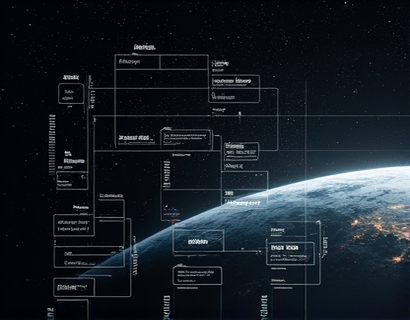Decentralized DAO Management: Harnessing Advanced Software for Enhanced Governance and Data-Driven Insights
In the rapidly evolving landscape of decentralized finance and autonomous organizations, the management of Decentralized Autonomous Organizations (DAOs) has become a critical area of focus. Traditional governance models are being transformed by the integration of advanced software solutions designed to streamline management processes and provide deep analytics. This transformation is essential for DAOs aiming to achieve sustainable growth, enhanced collaboration, and transparency. This article delves into the benefits and functionalities of advanced software tailored for DAO management, highlighting how these tools can revolutionize governance and data utilization.
Understanding DAO Governance Challenges
DAOs operate on blockchain technology, leveraging smart contracts to automate decision-making and execution. While this decentralized approach offers numerous advantages, it also presents unique governance challenges. Traditional hierarchical structures are replaced by community-driven decision-making, which can lead to inefficiencies, lack of transparency, and difficulty in scaling. The absence of centralized control means that coordinating actions and ensuring alignment among members can be complex. Moreover, the sheer volume of data generated by DAO activities necessitates robust tools for analysis and insight generation.
Role of Advanced Software in DAO Management
Advanced software solutions are designed to address these challenges by providing comprehensive tools for governance, collaboration, and data analysis. These platforms offer a suite of features that enhance the overall management of DAOs, making governance more efficient, transparent, and data-driven. By leveraging these tools, DAO managers can streamline processes, improve communication, and make informed decisions based on real-time data insights.
Streamlining Governance Processes
One of the primary benefits of advanced software in DAO management is the streamlining of governance processes. These platforms automate routine tasks such as proposal submission, voting, and execution, reducing the potential for human error and increasing efficiency. For instance, automated workflows ensure that proposals go through the necessary stages, from creation to approval, in a structured manner. This not only speeds up the decision-making process but also enhances accountability, as each step is recorded and transparent.
Moreover, advanced software often includes features for role-based access control, allowing different members to have specific permissions based on their roles. This ensures that only authorized individuals can perform certain actions, adding a layer of security and preventing unauthorized modifications. The automation of governance tasks also reduces the administrative burden on DAO members, enabling them to focus on more strategic activities.
Enhancing Collaboration and Communication
Collaboration is a cornerstone of successful DAO operations, and advanced software plays a pivotal role in fostering effective communication and teamwork. These platforms provide integrated communication tools such as chat, forums, and announcement boards, facilitating seamless interaction among members. Real-time updates and notifications ensure that everyone is informed about ongoing discussions, proposals, and important milestones.
Furthermore, advanced software often includes collaborative document editing and management features, allowing members to work on proposals and reports simultaneously. Version control and change tracking ensure that all contributions are recorded and that the most up-to-date documents are always accessible. This level of collaboration not only improves efficiency but also builds a sense of community and shared purpose among DAO members.
Data-Driven Insights for Informed Decision-Making
One of the most significant advantages of advanced software in DAO management is the provision of deep analytics and insights. These tools collect and analyze data from various sources, including blockchain transactions, voting patterns, and member interactions. By transforming this data into actionable insights, DAO managers can make informed decisions that align with the organization's goals and the interests of its members.
For example, advanced analytics can identify trends in proposal adoption rates, helping managers understand which types of proposals are more likely to succeed. This information can guide the development of future initiatives and improve the overall proposal process. Additionally, sentiment analysis of member feedback and discussions can provide insights into the community's mood and preferences, enabling proactive measures to address concerns and enhance member satisfaction.
Another critical aspect is the monitoring of financial health and resource allocation. Advanced software can track transactions, expenses, and revenue streams, providing real-time financial dashboards. This transparency ensures that funds are used efficiently and that financial decisions are based on accurate data. By visualizing financial data, DAO managers can quickly identify areas for cost reduction or investment, contributing to sustainable growth.
Enhancing Transparency and Trust
Transparency is a fundamental value in the DAO ecosystem, and advanced software significantly enhances this aspect. By providing comprehensive and easily accessible data, these tools ensure that all members have the information they need to make informed decisions. Transparent governance processes build trust among members, reducing skepticism and fostering a more cohesive community.
Audit trails and immutable records are key features of advanced DAO management software. Every action, from proposal creation to execution, is logged and cannot be altered, providing a tamper-proof history of all activities. This level of transparency not only ensures accountability but also attracts more members and stakeholders who value openness and integrity.
Scalability and Flexibility
As DAOs grow and evolve, their governance needs become more complex. Advanced software solutions are designed to scale with the organization, handling increasing volumes of data and members without compromising performance. These platforms are also flexible, allowing customization to fit the specific requirements of different DAOs. Whether it's integrating with existing blockchain projects or adapting to new governance models, advanced software provides the necessary tools to support growth and adaptability.
Case Studies and Real-World Applications
Several DAOs have successfully implemented advanced management software, demonstrating its practical benefits. For instance, a decentralized governance platform for a community-driven project reported a 40% reduction in proposal processing time and a 30% increase in member participation after adopting the software. The streamlined processes and enhanced communication led to more efficient decision-making and a stronger sense of community engagement.
Another example is a decentralized finance (DeFi) DAO that used advanced analytics to optimize its lending and borrowing protocols. By analyzing transaction data and member behavior, the DAO was able to adjust interest rates and loan terms dynamically, improving liquidity and member satisfaction. The data-driven approach not only enhanced financial performance but also built trust among users.
Future Trends and Innovations
The landscape of DAO management software is continually evolving, with new innovations on the horizon. One emerging trend is the integration of artificial intelligence (AI) and machine learning (ML) to further enhance decision-making. AI can predict trends, optimize resource allocation, and even suggest governance strategies based on historical data and real-time insights. This level of intelligence can help DAOs stay ahead of challenges and capitalize on opportunities more effectively.
Another area of development is the creation of interoperable platforms that can seamlessly integrate with multiple blockchain networks and protocols. This interoperability will enable DAOs to collaborate more freely across different ecosystems, expanding their reach and impact. As the technology matures, we can expect even more sophisticated tools that simplify complex governance tasks and provide deeper insights.
Conclusion
Advanced software for DAO management is transforming the way decentralized organizations operate, offering a range of benefits that address the unique challenges of decentralized governance. By streamlining processes, enhancing collaboration, providing data-driven insights, and ensuring transparency, these tools empower DAOs to achieve sustainable growth and success. As the ecosystem continues to evolve, the adoption of advanced management software will become increasingly essential for DAOs aiming to thrive in the decentralized world.










































